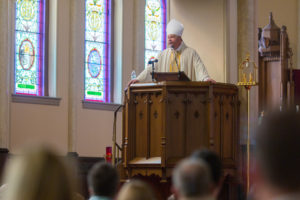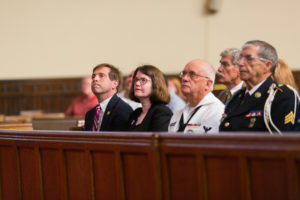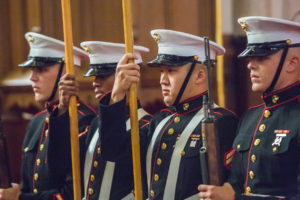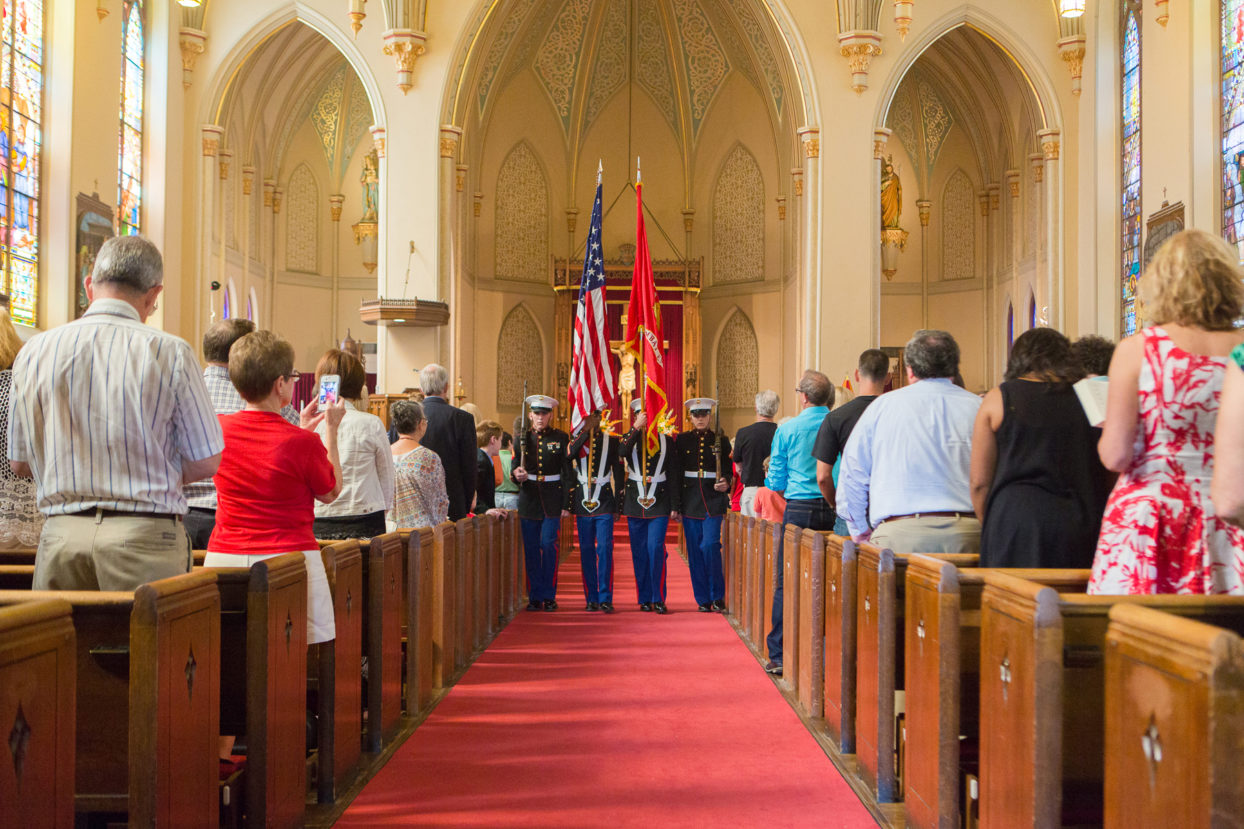Bishop Stika offers message of faith, forgiveness as Chattanoogans mourn deaths of servicemen
By Bill Brewer and Jim Wogan
An outpouring of sympathy and prayer has embraced the Chattanooga community and the families of five military men who were slain last month by a gunman who opened fi re on an armed forces recruiting center and a naval reserve facility.
Parishioners of the Basilica of Sts. Peter and Paul in downtown Chattanooga, only a few miles from the sites of the shootings, filled their church Sunday, July 19, for the 9 a.m. Mass, where Bishop Richard F. Stika delivered words of spiritual guidance and comfort to a city trying to make sense of a senseless act just three days before.
The solemn Mass began with a Marine Corps honor guard processing down the sanctuary aisle as the Navy Hymn, Eternal Father, Strong to Save, filled the basilica.
The liturgical procession included Bishop Stika, who celebrated the Mass, which was concelebrated by Father David Carter, rector of the basilica, Father Gilbert Diaz, pastor of Holy Family Church in Seymour, and Father Colin Blatchford, basilica associate pastor.
Delivering his homily to a congregation that included veterans and their families, Bishop Stika sought to comfort a community grieving from the deaths of four Marines and a Navy sailor who served in Chattanooga: Gunnery Sgt. Thomas Sullivan, Lance Cpl. Squire “Skip” Wells, Staff Sgt. Tony Ward, Sgt. Carson Holmquist, and Petty Officer 2nd Class Randall Smith.
Bishop Stika opened his homily by referencing the July 16 tragedy “in this great community of Chattanooga.”
“On that day, evil was made manifest in an individual, who interrupted the lives of a community, but in a very special way interrupted the lives of five people and their families and their loved ones as well as those involved in military service, especially the United States Navy and the United States Marine Corps, and all Americans,” he said.
Bishop Stika told the congregation they live in a world of great confusion, in a world at times in trouble, just as in years past, such as the 1930s and 1940s in Europe when evil crept into society.

Bishop Richard F. Stika delivers his homily to members of the Basilica of Sts. Peter and Paul on Sunday, July 19, three days after the shooting that killed four Marines and a sailor in Chattanooga.
“You know, for all of us, Jesus reminds us of love and mercy. And sometimes it’s hard to understand in our hearts when our lives are taken by an act of evil. Jesus so often talks about forgiveness and mercy, and turning the other cheek. Yet, just a few days ago that would be a very hard principle to live if you’re a member of the Marine Corps, or the Navy, or the Air Force, or the Army, the Merchant Marine, the Coast Guard, or an employee of the United States; or a mother, or a sister, or a brother, or a father who received the news just a few days ago that their son, who they might have thought was safe because they were not in Iraq or Afghanistan. If they were not in harm’s way, how could they have been killed in Chattanooga, Tennessee, in the heart of the South?
“How could it happen?” Bishop Stika asked. “My sisters and brothers, evil happens in places where so often we least expect it to be; not on a battlefield so many thousands of miles away, but in our own backyards, in our own families, in our own situations.”
The FBI still is investigating the incident in which a young Chattanooga man identified as the gunman, Mohammad Youssef Abdulazeez, 24, was shot and killed by Chattanooga police at a naval reserve center where the five servicemen were stationed and died.
Saying the challenge for everyone is how to respond to the evil in our own lives, Bishop Stika told parishioners they can’t control the actions of other people, but they can control their responses to the tragedy.
“We have no control over the man just the other day – a young man who belonged to another faith.
But what he did did not represent that faith,” Bishop Stika said. “For all of us, our response should be forgiveness.”
The bishop acknowledged that for many, forgiveness would be difficult to offer after such a heinous act.
“How can you forgive a person who has taken the life of a father of young individuals, who has taken the life of one who was just texting to his loved one? If you respond in anger or revenge, it begins to eat away at us. And in some ways then we become the person that we don’t want to be. And that can be true of our nation – one nation, under God, indivisible,” he said.
“Our response, if truly we are Christian, or truly if we are people of faith, no matter what that faith may be, if we believe, as children of Abraham, if we believe, then the challenge for all of us is to be the face of faith in our response,” he added.
Bishop Stika then shared with the veterans and those in military service who were in the congregation a belief of Gen. Dwight Eisenhower, who became the 34th president of the United States. According to the bishop, “Ike” once said a military is not so much people of war and warriors; servicemen and servicewomen are peacemakers.
“My sisters and brothers, as we mourn the loss of five individuals, as we mourn with their families, and as a nation, and as a world, we see a world that is filled with violence and terrorism, and it seems like an everyday occurrence. Perhaps the invitation from our Lord is to look at our own life and to start just one at a time. If we see another person, and we see a person of color or language or culture, not a creation of God, then we begin to form judgments. If we see the action of one individual and begin to gauge that individual as representative of a people, then we, too, have a change of heart, and not in a positive way,” the bishop said.
“My invitation to all of you, my sisters and brothers, is to look into your own hearts to see if you accept the mission of Jesus to be a peacemaker, to be a person of understanding, but also to be vigilant against evil, because evil, as I said, is in the places that we least expect it to be. If we allow it to creep into our heart with anger and malice, with prejudice, with not even a desire to be understanding, then the transformation in our own lives will be destructive,” he added. “If you’re looking for answers from me about why this individual did this, that’s it; evil entered into his heart in a misjudgment, a misguidance, and he committed an act of terror. But if we allow that terror to shape our lives and to be afraid of everyone, or to begin judging everyone, then we lose.”
Bishop Stika described the nation as one with great values that should respect everyone and appreciate the openness of many cultures.
Reminding parishioners that Jesus taught us to “judge not, lest ye be judged,” Bishop Stika said they would be remiss to not pray for the individual who took the servicemen’s lives, “and all of those who would do evil, that they would have a change of heart, that they will not see people of color or culture, or someone who might worship in a different way or speak in a different language.”
“We pray that evil might be eradicated from their hearts,” he said.

Congressman Chuck Fleischmann, left, his wife, Brenda, and military veterans listen to Bishop Richard F. Stika give a homily on the tragic shooting July 16 in Chattanooga that killed five servicemen.
Funerals for the five servicemen were held in late July. Sgt. Sullivan, 40, was buried July 27 in his native Springfield, Mass., following a funeral Mass at Holy Cross Catholic Church, where he was remembered by the bishop of Springfield, the governor, a senator and a congressman. Lance Cpl. Wells, 21, was laid to rest July 26 in Woodstock, Ga. The funeral for Staff Sgt. Wyatt, a 35-yearold married father of two children, was held in Chattanooga on July 24. A funeral for Sgt. Holmquist, 25, was held July 25 in his hometown of Grantsburg, Wis., where he graduated from high school in 2008 and joined the Marine Corps in 2009. And a funeral service for Petty Officer 2nd Class Smith, 26, was held July 28 in Fort Oglethorpe, Ga., where he and his family lived. Like Sgt. Wyatt, Petty Officer Smith was laid to rest at Chattanooga National Cemetery. He leaves behind a wife and three young daughters.
A Marine recruiter and a Chattanooga police officer were shot and wounded in the shooting.
Just before the basilica Mass concluded, U.S. Rep. Chuck Fleischmann, R-Chattanooga, spoke to the congregation about the terror attack. The congressman said he was on the floor of the U.S. House of Representatives during a voting session when a colleague first informed him that a tragic incident was unfolding in his hometown.
As he tried to make his way home, the congressman discovered flights into and out of Chattanooga had been canceled. He was able to get a flight into Knoxville and was escorted to Chattanooga, where he immediately went to the scenes of the shootings that took place earlier in the day.
“We have lost five of our bravest. Now, think about that. Our faith tells us that all human life is sacred. So the loss of one life is horrific. And we have lost five; a sad day in Chattanooga history. The saddest day I have had here,” Rep. Fleischmann said.
He praised faith leaders from all denominations, Catholic, Protestant, Jewish as well as people from minority communities, for joining together in support of the families impacted by the shootings and the community at large.
“So, where do we go from here? We mourn. … But we heal. We begin the healing process. And how do we do that? We pray harder. We look to God. We look to the precious gift of faith that we have. We pray for those who died, for their families, for our leaders, and for our great nation. And I pray to God this never happens again in the United States of America,” said Rep. Fleischmann, who is a parishioner in the Diocese of Knoxville.

A U.S. Marine Corps honor guard stands at attention during Mass on Sunday, July 19, at the Basilica of Sts. Peter and Paul in Chattanooga, where Bishop Stika’s homily was on the shooting deaths of five servicemen.
“But as we heal, let us not forget that we still are the greatest midsize city in America – Chattanooga, Tennessee. Let us resolve to love more and to hate less. Let us resolve to work together and be unified and less divisive. Let us resolve that that horrible day will not be what Chattanooga, Tennessee, is known by, not by some mad, horrific, evil gunman, but by the wonderful people of this city who reached out with love and compassion, because that is what we are about. We are Chattanooga strong. We are ready to move forward. We are ready to heal. Let Chattanooga strong be America strong,” he concluded.
On the afternoon of the shooting, Father Carter led a prayer service at the basilica, where some 50 faithful prayed for the shooting victims and their families. He said the shooting hit very close to home.
“We’re all shocked by it. We didn’t expect it to happen in Chattanooga,” Father Carter said. “I have parishioners who went to high school at Red Bank with the shooter.”
While the basilica community and all of Chattanooga struggled to understand the incident being investigated by federal authorities as an act of terrorism, Father Carter said the city and its Catholic parishes are poised to overcome the tragedy.
“We’re saddened that our city had to experience such violence. But we have a way of uniquely responding to this situation. We’re responding with hope and the belief that we play a part in making the world a better place, and there’s far more good we can do to overcome the senseless acts of violence,” he said.
“We’re called to be light in the darkness,” he added. “It (prayer service) was a sobering, somber experience that changed into one of hope as we invited God to help make sense of the situation.”

